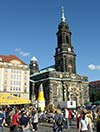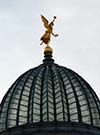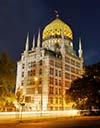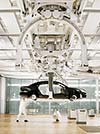Sightseeing
 Dresden
Tourism's English-language City Guide map will point you in the right
direction when you're ready to explore the Altstadt. Its suggested walking tour
begins at the Rathaus, or City Hall, where you can see a model of the
city in the atrium. Next, head for the Kreuzkirche, where the
tower viewing platform is worth the easy
climb.
Dresden
Tourism's English-language City Guide map will point you in the right
direction when you're ready to explore the Altstadt. Its suggested walking tour
begins at the Rathaus, or City Hall, where you can see a model of the
city in the atrium. Next, head for the Kreuzkirche, where the
tower viewing platform is worth the easy
climb.
Just beyond the Kreuzkirche and the Altmarkt is the
Kulturpalast,
which was built in 1969 and is the home of the Dresden Philharmonic Orchestra.
Not far away, along Wilsdruffer Strasse (a modern street
from the GDR era) is the Landhaus, home of Saxony's parliament in the
18th Century and now the Dresden City Museum.
 To
the east is Neumarkt, where you'll find the
Frauenkirche, a massive domed church that was built as a Lutheran rival to
St. Peter's Basilica in the early 1700s. (You can visit the dome and its viewing
platform if you don't mind narrow stairs, curving ramps, and dizzying views.)
To
the east is Neumarkt, where you'll find the
Frauenkirche, a massive domed church that was built as a Lutheran rival to
St. Peter's Basilica in the early 1700s. (You can visit the dome and its viewing
platform if you don't mind narrow stairs, curving ramps, and dizzying views.)
 Also
nearby is the Brühlsche Terrasse, a former rampart with attractive views that you can
reach via a flight of steps. The Kunstakademie or Academy of Arts is
located here; look for its distinctive glass dome with a golden angel on top.
Also
nearby is the Brühlsche Terrasse, a former rampart with attractive views that you can
reach via a flight of steps. The Kunstakademie or Academy of Arts is
located here; look for its distinctive glass dome with a golden angel on top.
 The
New Synagogue
was built to replace the old Semper Synagogue, which was destroyed in 1938 under
the Nazi regime. It opened in 2001 and incorporates fragments of its
predecessor.
The
New Synagogue
was built to replace the old Semper Synagogue, which was destroyed in 1938 under
the Nazi regime. It opened in 2001 and incorporates fragments of its
predecessor.
 Dresden
is most famous for its Baroque architecture, but the
Stallhof
makes it clear that the Renaissance wasn't an era to be sneezed at--even in the
city of the August the Strong. The 16th Century building, with its Italian-style
arcade, was built for courtly tournaments.
Dresden
is most famous for its Baroque architecture, but the
Stallhof
makes it clear that the Renaissance wasn't an era to be sneezed at--even in the
city of the August the Strong. The 16th Century building, with its Italian-style
arcade, was built for courtly tournaments.
 The
Fürstenzug, or Procession of Princes, is a 20th Century addition to the
Stallhof's exterior. It shows all the rulers of Saxony from 1123 to 1904 on a
Meissen tile mural that measures 102 meters or 335 feet long. (The current
Fürstenzug dates back to 1907; it replaces a painted version from 1876 that
began chipping off after several decades.)
The
Fürstenzug, or Procession of Princes, is a 20th Century addition to the
Stallhof's exterior. It shows all the rulers of Saxony from 1123 to 1904 on a
Meissen tile mural that measures 102 meters or 335 feet long. (The current
Fürstenzug dates back to 1907; it replaces a painted version from 1876 that
began chipping off after several decades.)
 The
former Hofkirche or Court Church (now the Cathedral), Residenz-Schloss
(a reconstructed royal palace, now the home to several museums), and the Schinkelwache (a Greek Revival building that houses the ticket office of the
nearby Semper Opera) are other essential stops on any walking tour of the
Altstadt.
The
former Hofkirche or Court Church (now the Cathedral), Residenz-Schloss
(a reconstructed royal palace, now the home to several museums), and the Schinkelwache (a Greek Revival building that houses the ticket office of the
nearby Semper Opera) are other essential stops on any walking tour of the
Altstadt.
 The
Zwinger
(Dresden's most famous building, which houses the Porcelain Collection and 10
other museums) is also a "must-see." Don't miss the
Glockenspiel,
a carillon with 40 Meissen porcelain bells that survived World War II's bombing
raids.
The
Zwinger
(Dresden's most famous building, which houses the Porcelain Collection and 10
other museums) is also a "must-see." Don't miss the
Glockenspiel,
a carillon with 40 Meissen porcelain bells that survived World War II's bombing
raids.
 Dresden
also has one building that nearly always confuses visitors: The
Yenidze looks like a mosque but
is actually a cigarette factory (built from 1907-1909) that was designed to
evoke the atmosphere--architecturally and culturally, if not literally--of
Turkey's Yenidze tobacco-growing region. Today it's an office building with a
360į panoramic restaurant.
Dresden
also has one building that nearly always confuses visitors: The
Yenidze looks like a mosque but
is actually a cigarette factory (built from 1907-1909) that was designed to
evoke the atmosphere--architecturally and culturally, if not literally--of
Turkey's Yenidze tobacco-growing region. Today it's an office building with a
360į panoramic restaurant.
 Venture
outside the city center, and you'll find examples of 19th Century architecture
(especially across the river in the Dresden-Neustadt district) and modern
buildings from the GDR era and since German reunification.
Venture
outside the city center, and you'll find examples of 19th Century architecture
(especially across the river in the Dresden-Neustadt district) and modern
buildings from the GDR era and since German reunification.
If you have time, drive or--better yet--take a tram and ferry or
bus to the
Schloss & Park Pillnitz, the summer residence of the Wettin dynasty, which is across
the Elbe at the eastern edge of the city.
 For
more advice on what to see in Dresden, visit the tourist office's
Sightseeing in
Dresden pages.
For
more advice on what to see in Dresden, visit the tourist office's
Sightseeing in
Dresden pages.
Tours and excursions
 The
Dresden tourist office can help you book local sightseeing tours. Another
possibility is a double-deck "hop on, hop off" bus, which comes in two flavors:
a red bus or a
two-tone bus, with slightly
different itineraries. If you don't read German, use Google Translate to compare
the tours (or, better yet, discuss your options at the tourist office.)
The
Dresden tourist office can help you book local sightseeing tours. Another
possibility is a double-deck "hop on, hop off" bus, which comes in two flavors:
a red bus or a
two-tone bus, with slightly
different itineraries. If you don't read German, use Google Translate to compare
the tours (or, better yet, discuss your options at the tourist office.)
 If
buses are too mundane for your tastes, you can pedal with friends or strangers
on a Conferencebike tour,
drive a vintage Trabant automobile in a Trabi
Safari convoy, or book an English-language "In the Footsteps of Kurt
Vonnegut - Slaughterhouse 5 Tour" with
Nightwalk - Dresden.
If
buses are too mundane for your tastes, you can pedal with friends or strangers
on a Conferencebike tour,
drive a vintage Trabant automobile in a Trabi
Safari convoy, or book an English-language "In the Footsteps of Kurt
Vonnegut - Slaughterhouse 5 Tour" with
Nightwalk - Dresden.
 In
nice weather, don't miss a chance to
cruise on the Elbe by paddle steamer. (Some boats offer scheduled service to
Meissen, where tours of the porcelain factory are available; you can also reach
Meissen by S-Bahn suburban train.)
In
nice weather, don't miss a chance to
cruise on the Elbe by paddle steamer. (Some boats offer scheduled service to
Meissen, where tours of the porcelain factory are available; you can also reach
Meissen by S-Bahn suburban train.)
 Finally,
Volkswagen's "Transparent Factory"
is a remarkable marriage of architecture and industry where electric vehicles
are assembled in a spotless factory that resembles a modern-art museum with
cars. (Fun fact: Car parts are delivered
to the factory in specially-designed trams, using Dresden's public streetcar
tracks.)
Finally,
Volkswagen's "Transparent Factory"
is a remarkable marriage of architecture and industry where electric vehicles
are assembled in a spotless factory that resembles a modern-art museum with
cars. (Fun fact: Car parts are delivered
to the factory in specially-designed trams, using Dresden's public streetcar
tracks.)